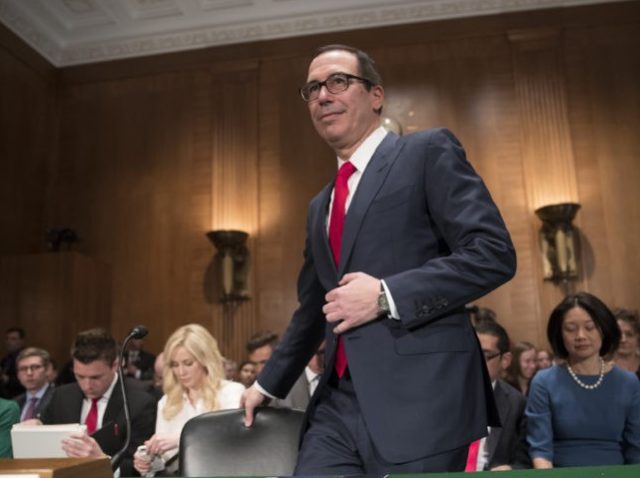Treasury Secretary Steven Mnuchin said on Wednesday that breaking up the biggest banks would be a “huge mistake.”
The Trump administration does not support forcing financial companies to separate commercial banking from investment banking, Mnuchin said at a Senate Banking Committee hearing. Mnuchin’s words are likely to ease concerns on Wall Street that the administration would attempt to break-up the biggest banks, while disappointing supporters who want to see the banks broken up.
“During the campaign, and I had the opportunity to work with the president on this, specifically came out and said we do support a 21st century Glass-Steagall. That means there are aspects of this that we think may make sense. But we never said before that we supported a full separation of banks from investment banking,” Mnuchin said in an appearance before the Senate banking committee.
The Treasury Secretary was answering pointed to questions from Senator Elizabeth Warren, who described this position as a reversal of the administration’s earlier endorsement of Glass-Steagall. Mnuchin said that the administration’s position on banks has remained consistent with its position during the campaign.
This was the first time that a Trump administration official has said that in its view a 21st century Glass-Steagall would not require the separation of commercial banks and investment banks. The original Glass-Steagall Act of 1933 required financial firms to chose between operating as investment banking broker-dealers and commercial banks deposit insurance support.
The hearing quickly became heated, with Warren become increasingly annoyed with Mnuchin’s answers.
“There are aspects of Glass-Steagall that you support but not breaking up the banks and separating commercial banking from investment banking? What do you think Glass-Steagall was if that’s not right at the heart of it?” Warren asked.
“I’m well aware of what Glass-Steagall was,” Mnuchin said.
“This is like something straight out of George Orwell,” Warren said.
Mnuchin argued that the purpose of Glass-Steagall was to avoid conflicts of interests that can arise when banks act as brokers and securities dealers as well as lenders and deposit takers.
“As you may know the original concern about Glass-Steagall was about conflicts, not about credit risk. And if we had supported a full Glass-Steagall we would have said at the time that we believed in Glass-Steagall and not a 21st Century Glass-Steagall. We were very clear in differentiating it,” Mnuchin said.
“Just tell me what 21st Century Glass-Steagall means if it doesn’t mean breaking apart those two functions. It’s an easy question – or an impossible question,” Warren said.
“It’s actually a complicated question because there’s many aspects of it, OK? The simple answer, which we don’t support, is breaking up banks from investment banks. We think that would be a huge mistake. But again, I’m more than happy to listen to your ideas on it. You obviously have strong views, and I’d be happy to follow up and listen to you,” Mnuchin replied.
“This is just bizarre, the idea that you could say we are in favor of Glass-Steagall but not breaking up the banks,” a clearly frustrated Warren said.
“We never said we were in favor of Glass-Steagall, we said we were in favor of a 21st Century Glass-Steagall,” Mnuchin said.
Mnuchin did not elaborate on which aspects of Glass-Steagall the administration supports as part of the 21st century version. Dealbreaker, widely-read by Wall Street’s younger set, described Mnuchin’s answers as having “the cosmic incomprehensibility of a Buddhist koan.”

COMMENTS
Please let us know if you're having issues with commenting.